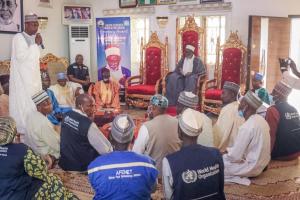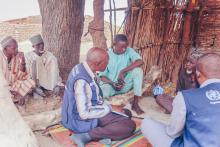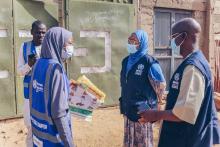Working with the communities to fight against meningitis
Damaturu, 14 May, 2024 - For yet another year, Nigeria is facing an outbreak of cerebrospinal meningitis strain C. While medical interventions are crucial, an equally vital aspect of the response lies in grassroots engagement to safeguard the health of the public.
Leveraging this, the World Health Organization (WHO collaborated with Yobe State Government to engage local leadership and grassroots participation to drive the community sensitization and awareness campaigns to contain the outbreak.
Meningitis is a serious infection, that leads to the inflammation of the membrane that surround and protect the brain and spinal cord. It is transmitted from person-to-person through droplets of respiratory or throat secretions from carriers. In Yobe state, at least 84 persons have been killed (as of week 15, 2024) from the ongoing outbreak of cerebrospinal meningitis (CSM).
Containing the meningitis outbreak in a prolonged humanitarian crisis state like Yobe is critical not only for preventing unnecessary loss of life but also for preserving the health, well-being, and stability of affected populations and preventing the escalation of the crisis.
WHO with funding from the United States Agency for International Development/Bureau for Humanitarian Aid (USAID/BHA) led stakeholder engagement including religious, traditional, and community leaders across the affected Local Government Areas (LGAs).
Commending the state government, WHO and other partners for the sensitization campaign, Hakimi Mai Hassan, the Emirate Focal Person on behalf of the Emir of Fika, his Royal Highness and Chairman Council of Chiefs Yobe state, Alhaji Muhammadu Ibn Abali says, engaging with the community members through the traditional/religious leaders is one of the most effective ways to contain this outbreak of meningitis.
“I am glad we are fully notified and involved to the brim, and we commend and appreciate the team for this high-level engagement. We will work closely to ensure intensified awareness.
In his remark , the Mr Abdullahi Danchuwa, the Executive Secretary, Yobe State Emergency Medical Ambulance Service on behalf of the Commissioner for Health, Dr Mohammed Lawan Gana says, effective community engagement and participation is a non-negotiable approach that would continue to be leveraged in other to curtail this outbreak, and WHO’s leadership in leading partners and other stakeholders to ensure this segment is strengthened is very commendable.
“Aside from re-strategizing the approaches of community engagement, the WHO has also trained healthcare workers to ensure quality services are provided across the affected Local Government Areas (LGAs), and we are certain, in no distant time the outbreak will be contained.
Furthermore, WHO is supporting the state to strengthen the surveillance, laboratory, case management pillars, as well as the provisioning of on-the-job mentoring, and harmonization and quality check for data.
In addition to strengthening of the thematic areas, at least 100 community-recognized active case search teams have been trained and deployed across the hotspot locations. This is in-line to intensify awareness on prevention of meningitis and boost early detection/reporting of suspected cases from the community. These approaches will complement the effort of the existing local structures such as the presence of the traditional, religious, and community leaders.
Restating the World Health Organization’s (WHO) commitment as the lead agency in international health response including in a prolonged humanitarian crisis, WHO Northeast Nigeria Interim Emergency Manager, Dr Kumshida Yakubu Balami says, most at times in an outbreak, communities who are vulnerable to epidemic diseases suffer the most. Notwithstanding, the WHO is constantly reviewing/re-strategizing the community engagement approach to a more sustainable and effective way especially ensuring no vulnerable person is left behind.
Dr Balami added that ‘structures such as the WHO-supported mobile hard-to-reach teams have been repurposed and redeployed to ensure underserved populations living in difficult locations are reached with basic services including health risk messaging.’
Additionally, through the International Coordinating Group (ICG), WHO facilitated the approval and the availability of 400,825 doses of Men5CV (ACYWX Conjugate Vaccine) for the vaccination campaign. The campaign targeted susceptible individuals from 1yr – 29yrs across Potiskum and Nangare Local Government Areas (LGAs) in Yobe state.





